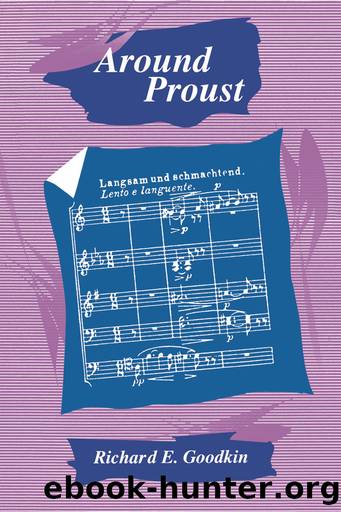Around Proust by Richard E. Goodkin;

Author:Richard E. Goodkin; [Goodkin;, Richard E.]
Language: eng
Format: epub
ISBN: 9781400820597
Publisher: Princeton UP
Published: 2022-09-15T00:00:00+00:00
"A PLACE PROLONGED WITHOUT MEASURE IN TlME," OR, ZENO MEETS HIS MATCH
That the madeleine episode abounds in abstract terms ending in "-té" shouldn't surprise us, given its status as a founding moment of general and abstract truth.
A delicious pleasure had invaded me, isolated, without the notion of its cause. It had immediately made the vicissitudes of life indifferent to me, its disasters inoffensive, its brevity [brièveté] illusory. (1.45)
I put down my cup [tasse] and turn toward my mind. I must rely on my mind to find the truth [vérité]. (45)
And I once again begin to wonder about this unknown state, which brings no logical proof but rather evidenceâof its felicity, of its reality [de sa félicité, de sa réalité]ânext to which all else fades. (45)
And each time the cowardice [lâcheté] that makes us turn away from any difficult task, from any important work, advised me to leave all that, to drink my tea [mon the] and simply think about today's worries and tomorrow's desires. (46)
The "vérité" hidden within the experience of the madeleine makes life's "brièveté" illusory. The incident takes place in a state of unprecedented "félicité" and "réalité," and only Marcel's "lâcheté" might stop him from finding out why. Although this is an episode about drinking tea, or "thé," it appears to be less concerned with that humble drink than with grand abstract notions ending in "-té": vérité, réalité, félicité.
And yet, just as the value of Swann's image of an "Odette de bonté" can be understood only in relation to the "Odette de bon thé" of which it is the implicit rejection, the proliferation of words ending in "-té" here should not distract us from the importance of Marcel's "thé." The text makes an almost explicit opposition between the great truths sought after here and the brew Marcel is drinking: cowardice tells him to leave aside his search for the truth and to drink his "thé," which, as in Odette's case, becomes a metaphor for the particularâ"today's worries and tomorrow's desires," whatever they might beâunattached to any larger or more general scheme of things.
This might lead us to believe that if veritas is in vino, it is most decidedly not in tea; in the passage quoted above Marcel puts down his "tasse" or cup in order to concentrate on finding the "vérité" he is after. But the last word ending in "-té" in the madeleine episodeâand consequently the final abstract term of the long prelude to the Recherche that the madeleine episode brings to a closeâtells us that if "vérité" is not in "thé," "solidité" is: "... all those things that take form and solidity [solidité] came outâcity and gardensâof my cup of tea [de ma tasse de thé]" (1.48). What takes "form and solidity" is precisely the concrete and particular elements of the narration about Combray that immediately follows. And this instantaneous movement toward the particular and away from the enormous questions of truth, reality, and felicity is precisely what is surprising about the relation of the madeleine episode to "Combray.
Download
This site does not store any files on its server. We only index and link to content provided by other sites. Please contact the content providers to delete copyright contents if any and email us, we'll remove relevant links or contents immediately.
The Power of Myth by Joseph Campbell & Bill Moyers(925)
Half Moon Bay by Jonathan Kellerman & Jesse Kellerman(911)
A Social History of the Media by Peter Burke & Peter Burke(883)
Inseparable by Emma Donoghue(844)
The Nets of Modernism: Henry James, Virginia Woolf, James Joyce, and Sigmund Freud by Maud Ellmann(740)
The Spike by Mark Humphries;(719)
A Theory of Narrative Drawing by Simon Grennan(707)
The Complete Correspondence 1928-1940 by Theodor W. Adorno & Walter Benjamin(705)
Ideology by Eagleton Terry;(659)
Bodies from the Library 3 by Tony Medawar(649)
Culture by Terry Eagleton(646)
World Philology by(645)
Farnsworth's Classical English Rhetoric by Ward Farnsworth(641)
A Reader’s Companion to J. D. Salinger’s The Catcher in the Rye by Peter Beidler(614)
Adam Smith by Jonathan Conlin(608)
High Albania by M. Edith Durham(592)
Game of Thrones and Philosophy by William Irwin(592)
Comic Genius: Portraits of Funny People by(581)
Monkey King by Wu Cheng'en(577)
